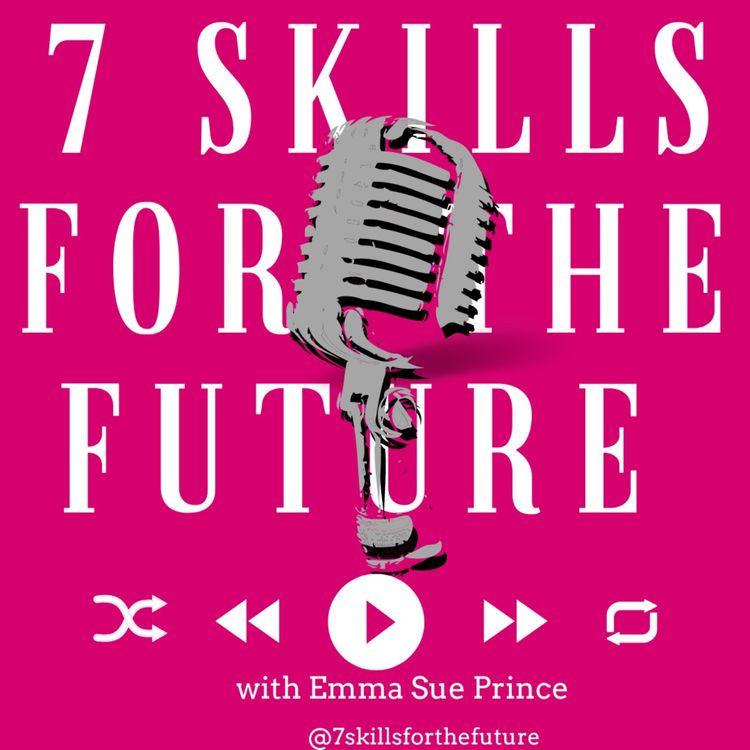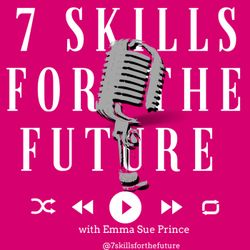Share

7 Skills For the Future
Season 1 Episode 5 Empathy - your super power and the skill that can transform EVERYTHING!
Season 1, Ep. 5
•
Developing skills that are uniquely “human” such as active listening, caring and nurturing are key for the world of the future. These things can’t be outsourced or automated and are still going to be important for whatever job you have. Empathy is has been proven to be essential for enhancing our interpersonal relationships, overall life satisfaction and improving our ability to respond well to challenges. In this podcast I’ll be talking about how nurturing your empathy skills will supercharge all your relationships and some easy ways to get it into your day-to-day.
More episodes
View all episodes

1. Season 1 Episode 1 The World We are Living In - why 7 skills really are all you need to get by
15:45||Season 1, Ep. 1We are not well equipped to navigate our way through life given the unprecedented pace of change, complexity, technology shifts. We are overloaded with information, we pay attention far less and are massively distracted for most of the time. Although we have all the information and knowledge we could possibly need at our fingertips when it comes to living our lives with purpose, passion and happiness we are not effective. In this podcast I explore just why the 7 soft skills are the only ones we need to be successful and happy.
2. Season 1 Episode 2 Adaptability - find out how to nurture this skill so you can handle any change with ease and grace
18:15||Season 1, Ep. 2Adaptability is an attractive quality. We all like to think of ourselves as being flexible and adaptable, a team player, “going with the flow”. It means that we are not rigid or stuck and that are open to change and challenges. I think if you were to ask most people if they consider themselves to be open and adaptable, they would tell you ‘yes’. If you truly are adaptable then you are more likely to handle change with grace and ease, not be thrown by the unexpected and be a lot happier. Yet most of us are actually a lot more resistant to change than we might perceive ourselves to be. In this podcast I’ll explore why we are hard-wired to be adaptable but also why we are so resistant to change and some ways to build our adaptability skills.
3. Season 1 Episode 3 Viv Groskop - what a joy to interview this talented comedian, journalist and author of the most fabulous book “How to Own the Room”.
36:36||Season 1, Ep. 3Viv Groskop is a talented comedian, journalist and author of the most fabulous book “How to Own the Room”. This book has completed transformed the way I look at presenting and speaking publicly. Viv encourages women everywhere to own their space and have their voices heard. Viv also has her very own successful podcast I urge you to follow! I am delighted to be interviewing her in this podcast – we’ll be talking about resilience and adaptability and yes, how to own that room!
4. Season 1 Episode 4 Critical Thinking - why we need to make space to think, get more creative and become solution-seekers!
16:41||Season 1, Ep. 4As a future skill critical thinking is about complex problem-solving, originality, fluency of your ideas and active learning. It’s also about leveragingy our brain’s capacity to be creative, have ideas and truly flourish. Recent research and insights by neuroscientists are discovering that our brains can be rewired and trained each and every day and indeed throughout our lives.In this podcast I’ll be talking about how to bring critical thinking into our everyday skills so that we become much better at it and enhance everything we do as a result.
6. Season 1 Episode 6 I interview Nathan Martin, Director of Global Thought Leadership Pearson on the skills we need for 2030 and beyond
20:37||Season 1, Ep. 6Nathan Martin is Director of Global Thought Leadership for Pearson. He’s one of the key influencers and voices behind Pearson’s 2030 research into the skills we need for the future. Today I’ll be talking to him about how those skills relate to the 7 I write about in my book. Well be discussing the crucial role of resilience, how education is rising up to meet these needs and why the future really is soft.
7. Season 1 Episode 7 Integrity - this is your number one skill for generating trust and always having direction for your life
14:53||Season 1, Ep. 7We live in a world of fake news, in a world where we can reinvent ourselves online and fabricate our lives however we want to. If you are authentic in your actions and words, keep your commitments, take responsibility for your choices and are sincere this makes you stand out and it builds TRUST. Today I’ll be unpicking what integrity is, what it isn’t and how understanding what your values are and how to manage your time help to build it.
8. Season 1 Episode 8 Optimism - a skill you can learn. Get happy fast and move through life with lightness and joy
13:37||Season 1, Ep. 8People with optimistic explanations of life generally feel happier and more energised to cope with obstacles, seeing them as challenges rather than failure experiences. Although of course how you feel matters, most people will respond to the world BASED on how they are feeling. However you are feeling, real optimism is about awareness and about functioning well even when you might feel sad. Instead it’s about building in positive behaviours that enable you to build and nurture your ability and your skill to be optimistic. In this podcast I’ll be exploring how you can easily build optimism into your life and be far happier as a result.
9. Season 1 Episode 9 Dr Sarah Mercer on wellbeing, self-awareness, leveraging our strengths and the crucial role of mindfulness
19:35||Season 1, Ep. 9I’m delighted to welcome Sarah Mercer to our podcast today. I first met Sarah at a conference for Business English teaching last November in Malta. And I really connected with her talk about socio-emotional competences as 21st century life skills and the key role that emotional intelligence plays. Naturally for me there was a strong link with some – possibly all – of the seven skills but I am particularly interested in Sarah’s views on self-awareness, the role of mindfulness, empathy and understanding about our strengths.